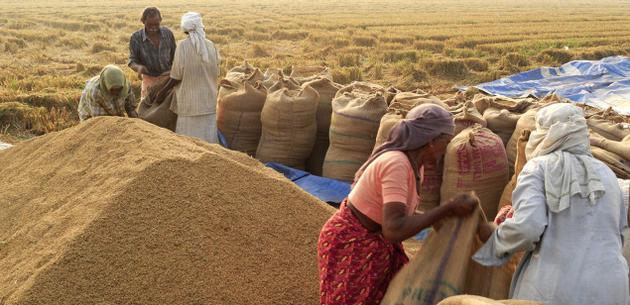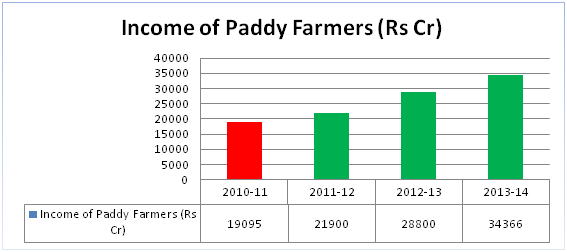One of the first announcements Chief Minister Mamata Banerjee made after coming to power was “Food for all.” To put words into action, she began with Junglemahal. She announced that all Adivasi families living in the Junglemahal region would get the same benefits of ration (public distribution system or PDS) as those received by below poverty level (BPL) families.
This was followed by a more inclusive announcement – that all families whose annual income in 2011 was Rs 42,000 or less would get all the benefits given to BPL families.
In fact, the budgetary allocation on food supply during the first year of the Trinamool Congress Government, in 2011-12, took a leap of almost 25 times from the previous year’s (2010-11) allocation, which was the last year in power for the Left Front, of Rs 13,40,72,000.
Benefits more spread out
The Trinamool Government has extended the selling of rice at Rs 2 per kg through the PDS to the Cyclone Aila-affected blocks, Darjeeling hills region, the land acquisition-protesting farmers of Singur, the Sabar, Lodha and Toto tribal communities, the poor families in the seven backward blocks of Birbhum, and the almost one lakh workers and their families in the 27 closed tea gardens.
Much higher budgetary spending
During its last four years in power, the Left Front Government budgeted Rs 55,98,75,000, or Rs 13,99,68,750 per year on an average, for the Food & Supplies Department. Compared to this, the Trinamool Government overshot that amount by almost seven-and-a-half times to spend Rs 419,72,83,000, or Rs 104,93,20,750 per year on an average, during its first four years.
As a consequence of the much higher spending, the food supply scenario has also improved hugely. The budgetary allocations by the Trinamool Government have improved progressively year after year to come to Rs 202,00,00,000 for 2015-16.
Grain storage capacity has improved tremendously
The major consequence of the budgetary spending on the Food & Supplies Department increasing by almost seven-and-a-half times has been an almost 21 times increase in the grain storage capacity in West Bengal. Naturally, more and more grains are reaching the people of the State.
Ninety per cent of the almost Rs 420 crore allocated for the Food & Supplies Department during the first four years of the Trinamool Government has been spent on shoring up the grain storage capacity. The current capacity has come to 3,24,830 metric tonnes. The capacity during the last two years of the Left Front rule was a mere 7750 metric tonnes.
It can easily be concluded that the Left Front Government had no genuine intention to improve the food supply situation in the State. Whatever it spent was based more on political reasoning than on social-economic necessities.
Other achievements
- Compared to the last two years of the Left Front rule, the current government is providing subsidised food grains through the PDS to 25% more people yearly, on an average.
- Not just that, all the 3,21,00,000 recipients are receiving food at the same rate – that is, rice at Rs 2 per kg and flour (atta) at Rs 5 per 750 g – which was not the case during the Left Front rule.
- During the last four years, the Trinamool Government has weeded out 1,35,18,287 fake ration cards, which is a very significant 15% of the number of cards issued till the end of the Left Front Government.
- During the last four years, almost 88.56% of ration cards have been digitilised. As a result of digitalisation, card-holders can procure ration from an outlet in the West Bengal, and it also would not be possible to have fake cards made.
- Under the Left Front Government, food grains had to be first brought to Food Corporation of India (FCI) godowns for storage and were distributed to ration shops from there. A lot of grains went bad due to improper storage conditions, and people often received grains of inedible quality. Now the Trinamool Government buys the grains directly from the farmers and stores them in its own godowns, which are much better. Hence, there is no wastage.
- The rate at which the State Government buys from the farmers has also improved. During the last three years of the Left Front rule, the price had improved from Rs 900 per quintal to Rs 1000 per quintal, that is, by 11%. Comparably, during the first four years of the Trinamool rule, the procurement price has improved from Rs 1080 per quintal (in 2011-12) to Rs 1360 per quintal (in 2014-15), an improvement of almost 26%.
- In February 2012, on the initiative of Chief Minister Mamata Banerjee, the Centre granted open general license (OGL) for exporting thicker grains of rice, which was till then limited only to rice of thin grains like basmati. As a result, farmers in West Bengal as well as in other States, earn much more.
- In addition to the normal amount of food grains, the current State Government has allotted an additional 9.5 kg per month for 4,412 malnourished children spread over 17 districts.
- Significantly too, the State Government wants 87% of the State’s population to be brought under the Centre’s Food Security Act, when the Centre wanted to bring only 67%.
- Last but not the least, the Trinamool Government has improved the food grain procurement and distribution system despite obvious partiality from the Centre. Both the rate at which the Centre procures grains and the quality it procures is less for West Bengal in comparison to many other States.






